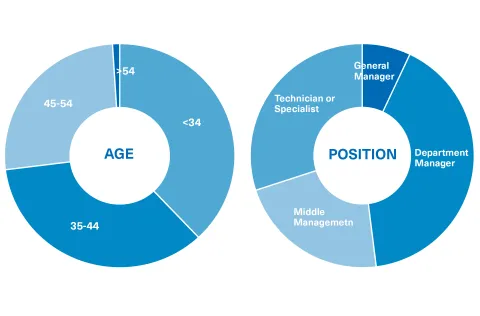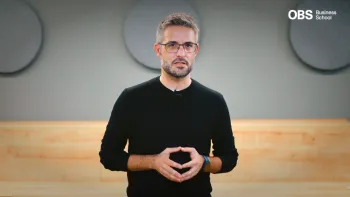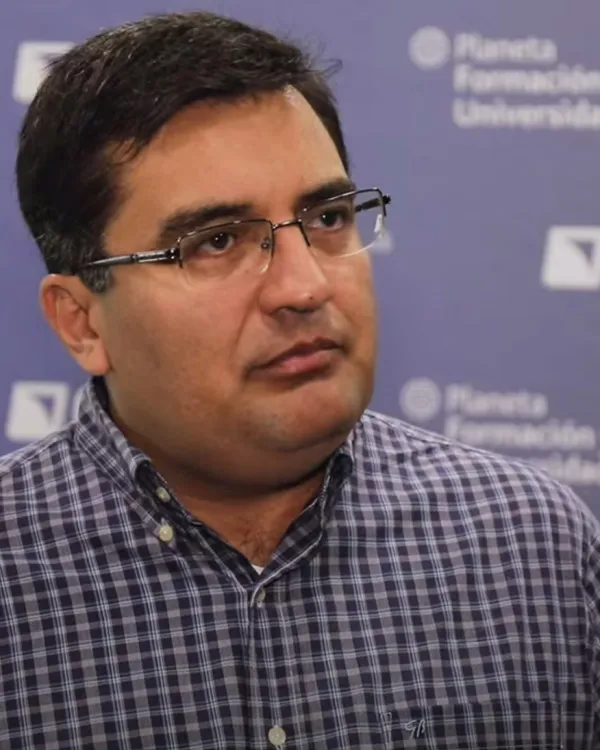
Master in Supply Chain Management and Logistics
School of Business Administration & Leadership
- ONLINE
- 60 ECTS
- 7800€
- OPEN CALL
- 12 MONTHS
- ENGLISH
The Master in Supply Chain Management and Logistics, with a Master's Degree in Lifelong Learning, provides you with the skills to lead the transformation of traditional business models by offering a comprehensive view of the management of supply chain processes. It prepares you to face the challenges of global supply chain management and lead effective and decisive teams.
Thanks to the agreement signed between OBS and ISCEA, once you have completed the programme, you will have the option of taking the exam to obtain the CSCA (Certified Supply Chain Analyst) and CSCM (Certified Supply Chain Manager) certifications from ISCEA. These are key accreditations for analysts, managers and coordinators of operations within the supply chain. Also, as a student of the Master, the school offers two exclusive and optional courses that prepare you to obtain the three Scrum.Inc certifications: the Scrum Master Certification, the Product Owner Certification and the Scrum@Scale Practitioner Certification.
Our Master in Supply Chain Management and Logistics is also available in Spanish:
Find out more about SPANISH MASTER IN SUPPLY CHAIN MANAGEMENT AND LOGISTICS

Master in Supply Chain Management and Logistics

Universitat de Barcelona
Get a double degree from our academic partner, the reference university in Catalonia and Spain with more than 560 years of history behind it.

Ranking El Mundo
The Programme has been recognised with the 3rd position in the Logistics category of the Ranking of the Best Online Masters in Spain according to the Ranking of El Mundo.

Ranking Eduniversal
The Master in Supply Chain Management and Logistics is the 2nd best master in Spanish in the Supply Chain and Logistics category of Eduniversal's Best Masters Ranking.
Master's Degree in Supply Chain Management and Logistics Syllabus
Our programme is structured in 3 blocks and culminates with the Final Project. In addition, during the programme there will be 4 voluntary bootcamps and different additional activities.
Block 1. Strategy and Decision Taking in Supply Chain
Block 2. Supply Chain Management
Block 3. Supply Chain Optimization
Master's Final Project
Bootcamps and Additional Activities
1. Strategy and Decision Taking in Supply Chain
This is a core module in our program. This course is designed to introduce you to the key concepts of operations and supply chain management, value proposition, competitiveness, and sustainability.
Professor: Josep Oriol Pastor Utzet, Operation Director and Supply Chain Manager at Ariston Thermo Group & Autoneum.
VIEW LINKEDIN
The objective of this subject is to bring students closer to basic financial aspects necessary for supply chain management. At the same time provide them with the essential elements for understanding the impact of the supply chain on the business.
The subject also reviews the phases in supply chain project management and provides an overview of the most trending project management methodologies.
Professor: Marta Caballero Mas, More than ten years of experience working for Danone in different senior management positions across Europe and North America.
VIEW LINKEDIN
2. Supply Chain Management
This subject offers an in-depth exploration of sales forecasting techniques and demand management strategies, aiming to synchronize production, inventory, and marketing initiatives with customer demand.
Upon completion of this module, attendees will have a solid understanding of sales forecasting techniques, becoming adept in a variety of forecasting methods, both quantitative and qualitative. They will be equipped to scrutinize demand patterns and trends, enabling them to make well-informed decisions.
Professor: Ángel García Izquierdo, Teaching at European University for Management Studies.
VIEW LINKEDIN
The subject on Supplier and customer relationship management focuses on the development of strong supplier and customer relationships, primarily based on the contribution of added value.
Throughout the module, students will explore the importance of efficiently coordinating the procurement, production, and distribution of goods and services to meet market demands. Additionally, strategies for building and maintaining lasting customer relationships will be addressed, understanding their needs and where the added value lies that customers are willing to return for.
This comprehensive approach will provide students with the necessary tools to face the current challenges of the globalized business environment.
The objectives outlined encompass a comprehensive understanding of the procurement process, highlighting the need to discern the differences between purchasing, sourcing, and outsourcing. Each plays a distinct role in the overarching procurement strategy, impacting the efficiency and effectiveness of acquiring goods and services.
Furthermore, the objectives emphasize the contrast between the structured, sequential approach of the waterfall methodology and the flexible, iterative nature of agile methodology based on Scrum tool.
Ultimately, these objectives converge on the pivotal role of procurement in delivering added value to the customer, affirming its significance in the success of any business endeavour.
Professor: Carmen Pérez del Reguero, Senior Purchase Manager at Stahl & DC Fine Chemicals & DSM Coating Resins & WestRock Dispensing Systems.
VIEW LINKEDIN
This course, focuses on the evolution and current state of production and quality management.
It emphasizes the need for agility and advanced techniques in operations management due to rapid technological changes and globalization.
The course aims to review production management models and apply those that fit the organization’s culture and production processes.
It underscores the importance of aligning operations strategy with corporate strategy and the role of production as a value-generating area.
This course aims to bridge the gap between theoretical knowledge and practical application, particularly in the field of production management. It seeks to situate production management within the broader context of the supply chain, and delve into various models that facilitate agile production and process optimization.
The course also explores production measurement systems and process efficiency, with a focus on working with Key Performance Indicators (KPIs) and associated management systems to achieve desired results. Students will gain a deep understanding of various management models such as Lean Manufacturing, QRM, Six Sigma, TOC, TPM, among other operations management tools.
Professor: Marcos Andrés Panaggio, Director of Operations at Transportes Malvinas.
VIEW LINKEDIN
This module focuses on equipping current and aspiring supply chain managers with essential leadership and executive skills.
It begins by exploring the modern profile of a supply chain manager, highlighting the key competencies and responsibilities required in today's dynamic environment.
The module then delves into leadership and talent development, emphasizing the cultivation of effective leadership qualities and strategies for nurturing talent within the team. Additionally, it covers critical aspects of team and time management, providing techniques for optimizing team performance and productivity. Finally, the module addresses emotional and strategic communication, teaching participants how to effectively convey messages and foster positive relationships within the supply chain.
Professor: Jesús Martínez Bustos, CEO Focus Inside.
VIEW LINKEDIN
This subject is designed to introduce you to the critical concepts of warehouse management, warehouse management systems (WMS), outsourcing warehouses, inland transportation, and sea and air freight transportation.
Throughout this course, you will learn about the strategic importance of storage location and inventory management in achieving distribution excellence. You will gain a deep understanding of how to effectively manage and control warehouse operations using warehouse management systems (WMS).
We will explore the benefits and challenges of outsourcing warehouses, and you will learn how to make informed decisions about when and how to outsource. You will also learn about different modes of transportation, including inland, sea, and air freight transportation, and how to choose the most effective and efficient mode for different logistics scenarios.
By the end of this course, you will have a comprehensive understanding of how to achieve excellence in distribution through effective storage location management, inventory control, handling transportation, and logistics management.
Professor: Igor Vargas Villavicencio, Supply Chain Manager at Synergy Sports Technology.
VIEW LINKEDIN
3. Supply Chain Optimization
The subject, explores the metamorphosis an organization undergoes when transitioning from a conventional management model to a Lean culture.
It explores the concept of an international supply chain and the ramifications of globalization, including tactics for engaging with overseas markets.
Additionally, the course offers an in-depth understanding of the documentation and payment methods associated with international commerce.
This subject is crucial for comprehending the complexities of global logistics within a Lean paradigm.
Professor: Màrius Gil Mendoza, Founder and Management Advisor in Apex Mindset.
VIEW LINKEDIN
This subject focuses on the challenges and strategic tools available to companies, particularly in operations.
Students will develop competencies to excel in the digital transformation landscape, covering innovation, data analytics, efficiency, robotics, and emerging technologies like AI, Machine Learning, and Blockchain.
The course emphasizes digital transformation in logistics and the integration of technology and data-driven decision-making.
Key learning areas include digital literacy, data-driven decision-making, supply chain integration, change management, risk management, and collaboration and communication.
Students will learn to adapt to technological advancements, lead digital transformation, work effectively with cross-functional teams, and communicate complex ideas clearly.
Professor: Manel Domínguez Moreno, Senior Project Manager and Eurpean Early Management Pillar leader at Owens Corning.
VIEW LINKEDIN
What causes the change? Which are the trends we should know about to be prepared?
Everything related to sustainability and climate change will have a significant impact on the supply chain: decarbonization, the circular economy, green logistics, the importance of ESG management are key aspects that all those responsible for the supply chain must know and apply in their work.
This module will also include the best practices in its application.
Professor: Javier San Martín María, Managing Partner OGGMK.
VIEW LNKEDIN
Final Project and Additional Activities
This programme is designed to complement the content of the thematic blocks with the necessary training to achieve their internalisation. The training is conceived from a threefold perspective: technical assistance, personal support and individual and group challenges that are necessary to achieve the objectives set.
Pre-Masters Bootcamps
The student will have the opportunity to take 2 Pre-Master Bootcamps that will be opened progressively and can be taken at any time. Once the course has been completed and passed, a certificate of completion will be awarded.
- Building Your Professional Brand for Employability and Career Success
- Finance Fundamentals
- Organizational Well-Being
Introductory workshop | Campus Training
Before the start of the academic year, students will have the opportunity to attend an introductory workshop on the Campus where they will be provided with the tools and knowledge necessary for the correct use of the platform during the academic year.
Professional Development Programme (PDP)
Two weeks before the start of the academic year, students will be able to participate in a professional development programme where they will work hand in hand with a teacher to develop different skills such as time management, productivity and stress management and emotional intelligence. Upon completion of the workshop, and provided that the relevant activities have been carried out, a certificate of completion can be obtained.
The Lifelong Learning Master’s Degree in Supply Chain Management and Logistics Master's Thesis is the culminating project that encapsulates the knowledge and skills acquired throughout the program.
It is a practical application of the theoretical concepts learned, allowing students to specialize in managing a specific project. The thesis converges on a final project related to Supply Chain Management. It could be an improvement project, an innovation project, or a management project that provides solutions to established problems.
The primary objective is for students to apply what they have learned throughout the program in a practical manner, simultaneously achieving specialization in managing a specific project. This hands-on experience not only solidifies their understanding but also prepares them for real-world challenges in the field of Supply Chain Management and Logistics
The Master's in Supply Chain Management and Logistics is complemented by lectures and seminars given in each of the blocks. These additional activities are carried out by renowned professionals in business management who, through videoconferences, present their experiences and case studies.
Bootcamp: Kanban boards and agile methodology for rapid response scenarios
Intensive and immersive learning experience designed to equip students with practical skills in creating Kanban boards for warehouses, productive workshops, and dynamic work teams. The bootcamp curriculum is grounded in the principles of Lean Management, Agile, and Rapid Response Management. These methodologies aim to streamline processes, promote efficiency, and enable quick response to changes.
Students will learn to construct Kanban boards, a visual tool that effectively manages work at different stages of the process. These boards are particularly useful in warehouses and production workshops, helping teams visualize workflow, limit work-in-progress, and maximize efficiency.
The ultimate goal of this bootcamp is to reduce team coordination times and balance resources in a balanced, coordinated, and autonomous way. By the end of the bootcamp, students will be equipped with the skills to implement these methodologies in real-world supply chain and logistics contexts, driving efficiency and productivity in their organizations.
Professor: Josep Oriol Pastor Utzet, Operation Director and Supply Chain Manager at Ariston Thermo Group & Autoneum.
VIEW LINKEDIN
Bootcamp: Operations management TFC
Learners have to make strategic and tactical decisions in the value chain of a company called The Fresh Connection, which is a virtual fruit juice producer. The Fresh Connection is a web-based Supply Chain Management learning environment built around a cross-functional business simulation.
While the virtual company is suffering severe losses, a new management team has been appointed. Four students take on a role in this new management team, either as Vice President of Purchasing, Vice President of Sales, Vice President of Operations or Vice President of Supply Chain.
The team is tasked with achieving the highest possible return on investment (ROI) for the company. The Fresh Connection takes the whole scope of the supply chain into account and addresses the main issues and their outcomes. The learner must make decisions in their unique functional area, based on adherence to the chosen value chain strategy, cooperation and alignment decisions will be the key factors that they will have to successfully perform in The Fresh Connection.
In addition to internal collaboration, external collaboration with suppliers and customers will be an important element in The Fresh Connection. The philosophy in the business game is experiential learning of how the students are implementing their value chain strategy in the simulated environment of this company.
Professor: Jose Luis Arizaleta Barquin, Consultant at Focus Inside.
Bootcamp: Change Management
Change is a constant in our current world, both in society and in companies, and this means that team leaders must be prepared and know how to meet the needs of the people who make change possible.
Throughout these sessions we will see different models for managing change such as Kotter's 8 steps, the necessary skills that people need to lead change, not just survive it. We will also learn about the DISC model and how its styles help us to understand people's behaviours in the face of change, seeing how to communicate with them and how to lead them.
Professor: Elisenda Porras González, Practitioner in NLP and Master Coaching in NLP and Lego® Serious Play ® Facilitator.
VIEW LINKEDIN
Bootcamp: Preparation for CSCA certification from ISCEA (International Supply Chain Education Alliance)
This bootcamp is designed to prepare students who wish to successfully pass the following ISCEA certifications:
- The CSCA "Certified Supply Chain Analyst" certification is essential for supply chain analysts and operations coordinators who rely on a strategic framework to plan distribution networks, determine inventory levels, participate in operations and sales S&OP planning, and use coordination and optimization tools such as: Lean six sigma and theory of constraints and information technologies.
- The CSCM "Certified Supply Chain Manager" certificate is widely recognized worldwide because it guarantees that its holder is capable of managing and directing supply chain activities in organizations.
Professor: Jorge Alberto Morales, CEO at ISCEA Latin America.
VIEW LINKEDIN
Company visits
During the programme, students will have the opportunity to attend synchronous videoconferences with professional experts in the programme area. They will share their experience and best practices in the sector.
Case studies: Case method
The practical component of the programme is indispensable and complements the theoretical training. To this end, during the course there will be debates on current topics of interest in each of the subjects, simulations for decision-making applied to real situations or case studies where the problems posed and the solutions proposed will be analysed from an academic point of view, as well as the criteria considered to carry them out.
Webinars
Most of the training is carried out asynchronously, i.e. the exchange of knowledge takes place through a platform that allows the sharing of written texts without the need for people to be connected at the same time.
Additionally, in each of the modules, synchronous sessions or 'webinars' are organised, where all participants are connected at the same time through an application, which allows the exchange of knowledge in 'real time'.
The Lifelong Learning Master’s Degree in Supply Chain Management and Logistics includes preparing students for the following certifications*:
- CSCA Certification (Certified Supply Chain Analyst) from ISCEA (International Supply Chain Education Alliance).
- CSCM (Certified Supply Chain Manager) certification (International Supply Chain Education Alliance)
In addition, students have the chance to enrol in the training courses for the following certifications*:
- Certificación Scrum Master & Product Owner
- Certificación Scrum Master@Scale
- Certificación Productot Owner@ Scale
- Certificación Value Stream Management
*The cost of the certifications and the preparatory course is not included in the price of the programme.
Methodology

OBS has an online methodology where the core is the student. Always endorsed by active lecturers of international prestige, who share their knowledge to enhance the professional development of students through a flexible, collaborative method and with personalized monitoring. The objective is to create a unique educational experience that allows the assimilation of knowledge in a practical way.
Student ON has the student as a fundamental pillar and, therefore, throughout the course the students have their Program Manager, an academic figure who accompanies them in a personalized way.
Diploma
After successfully finishing the Master's degree, and having completed the relevant procedures, you will receive the Master's degree from OBS Business School. In addition, and provided that you meet the established academic and administrative requirements, you will obtain a Lifelong learning Master's degree from the Universitat de Barcelona (UB).
In order to obtain it, you must have a university degree. In the exceptional case of not having this degree and having passed the Master's evaluations, you will obtain a Higher University Diploma from the Universitat de Barcelona (UB).
At OBS Business School we are committed to having our own degree, which allows us to quickly update and adapt the programmes in each edition to be at the forefront of the educational level demanded by companies today. Our programmes are designed for professionals who want to strenghten their management skills and learn through an international experience.

Admission Process
The fundamental aim of our admissions process is to ensure the suitability of candidates. All participants should get the most out of this learning experience, through a context in which it is possible to develop long-term relationships with classmates, faculty and alumni.
After completing the application form for one of our programmes, you will receive an e-mail with information about the School and a member of the Admissions Department will contact you to start the admission process.
Once you have successfully passed the personal interview, you must submit all the required documentation to continue the admission process and certify that you meet the requirements of the student profile. After the Admissions Committee, if it is positive, you will be able to register and enrol in the programme you have applied for.

Student Profile
Our students in the Master in Supply Chain Management and Logistics come from many sectors, but all have the objective of enhancing their managerial skills.

Master in Supply Chain Management and Logistics's Career Opportunities
Thanks to the Master in Supply Chain Management and Logistics of OBS Business School you will be able to develop your professional career as:
- Operations Manager
- Logistics manager
- Import / Export Manager
- Procurement Manager
- Supply Chain Manager
- Distribution Manager
- Inventory Control Manager
- Purchasing Manager
- Consultant on related issues


